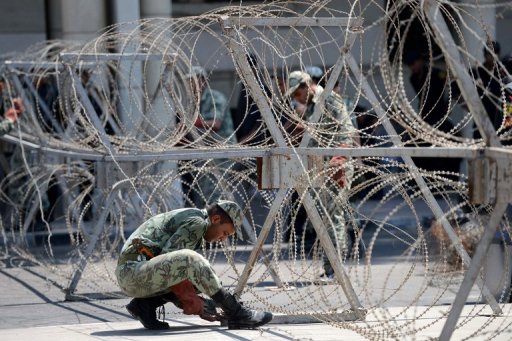TEHRAN: Iran began recounting some of the votes cast in its disputed presidential election Monday in an apparent attempt to placate opposition protesters.
Tehran also dismissed the idea of downgrading relations with Britain despite accusing that country of stirring up unrest.
The regime’s standoff with the West over its crackdown on demonstrators sharply escalated Sunday. Britain denounced the detention of local employees of its embassy in Tehran, and the European Union condemned what it called Iranian “harassment and intimidation.
Iranian Foreign Ministry spokesman Hassan Qashqavi told a news conference broadcast on state television Monday that five of the Iranian embassy staffers had been released and the remaining four were being interrogated.
Intelligence Minister Gholam Hossein Mohseini Ejehi claimed he had videotape showing some of the employees mingling with protesters, and said the fate of those who remain in custody now rests with Iran’s judiciary, which is tightly controlled by supreme leader Ayatollah Ali Khamenei.
But Qashqavi played down the dispute, saying Iranian officials were in written and verbal contact with British Foreign Secretary David Miliband, who called the allegations “wholly without foundation.
“Reduction of diplomatic ties is not on our agenda for any country, including Britain, Qashqavi said.
Iranian officials earlier had said they were considering downgrading ties with Britain, which expelled two Iranian diplomats last week – a retaliatory move after Iran ousted two British envoys.
The escalating diplomatic dispute came as riot police clashed with up to 3,000 protesters – some chanting: Where is my vote? – near the Ghoba Mosque in north Tehran on Sunday. It was Iran s first major post-election unrest in four days.
Witnesses told The Associated Press that police used tear gas and clubs to break up the crowd, and said some demonstrators suffered broken bones. They alleged that security forces beat an elderly woman, prompting a screaming match with young demonstrators who then fought back.
The reports could not be independently verified because of tight restrictions imposed on journalists in Iran.
North Tehran is a base of support for opposition Mir Hossein Mousavi, who insists he – not President Mahmoud Ahmadinejad – won the disputed election.
Iranian media said a partial recount involving a random 10 percent of ballots cast got under way Monday. It was unclear what purpose the recount would serve, since Khamenei and the Guardian Council – Iran s top electoral oversight body – already have pronounced the results free of major fraud and insist that Ahmadinejad won by a landslide. And Mousavi insists the government nullify the results and hold a new vote.
State TV said Mousavi representatives met with a Guardian Council election review panel, but it ended in a stalemate and officials decided to proceed with the recount.
Witnesses who spoke with the AP said they did not spot Mousavi at Sunday s rally. But one of his close assistants addressed the crowd through a loudspeaker and other opposition figures also appeared, including reformist presidential candidate Mahdi Karroubi.
Local news site Rooz Online said Mousavi and his wife, Zahra Rahnavard, were supposed to attend the protest – but when they couldn t reach the scene, Mousavi addressed supporters via a telephone held up to a megaphone, and spoke of the importance of the people s vote and peace.
Sunday s clashes erupted at a rally that had been planned to coincide with a memorial held each year for Ayatollah Mohammad Beheshti, who came to be considered a martyr in the Islamic Republic after he was killed in a major anti-regime bombing in 1981.
Iranian authorities say 17 protesters and eight members of the volunteer Basij militia have been killed in two weeks of unrest, and that hundreds of people have been arrested.
Ahmadinejad s Web site said Monday he has asked a top judge to investigate the killing of Neda Agha Soltan, a young woman who became an icon of Iran s opposition after video capturing her bleeding to death on a Tehran street was circulated worldwide.
Ahmadinejad said Soltan was slain by unknown agents and in a suspicious way, convincing him that enemies of the nation were responsible.
Iran s official IRNA news agency quoted Basij commander Hossein Taeb – whose militiamen have played a key role in the government s effort to quash protests – as saying that authorities arrested several people who dressed in police and Basiji uniforms and smashed car windows.
The Paris-based International Federation of Human Rights said its information suggests at least 2,000 arrests have been made – not just (people) arrested and later released, but who are locked up in prison, the group s vice president, Abdol Karim Lahidji, told the AP.
He said his information came from members of human rights groups in Iran and other contacts inside the country.
Iran s increasingly acrimonious relations with the West complicated President Barack Obama s hopes of engaging the regime in dialogue over its nuclear program. Iran insists its program is peaceful and geared solely toward generating electricity; the US and its allies contend that Tehran is covertly trying to build a nuclear weapon.
US officials said Sunday that the administration remains open to discussions on Iran s nuclear ambitions despite questions about the legitimacy of Ahmadinejad.
It s in the United States national interest to make sure that we have employed all elements at our disposal, including diplomacy, to prevent Iran from achieving that nuclear capacity, Susan Rice, the US ambassador to the United Nations, said on CBS Face the Nation.

